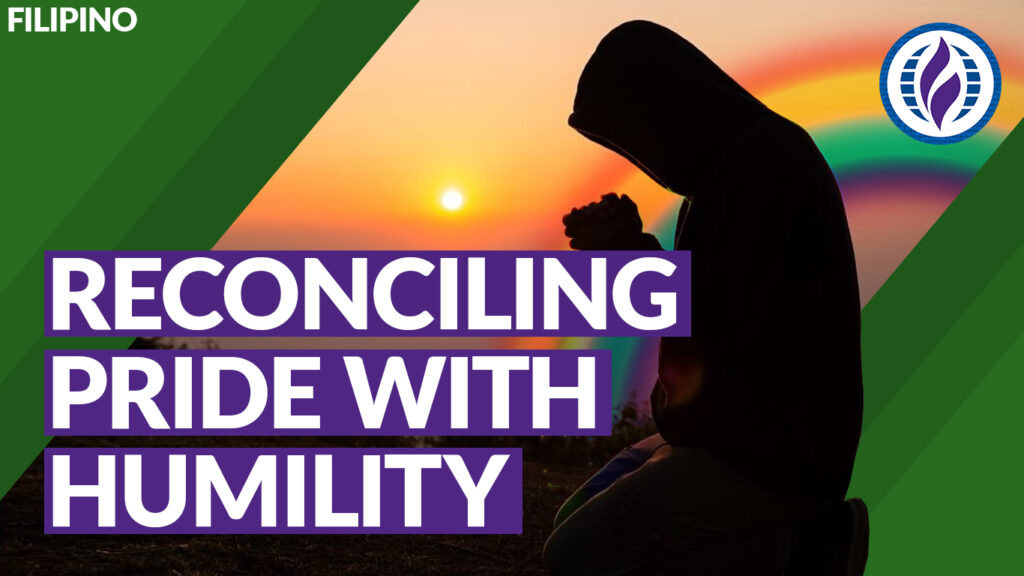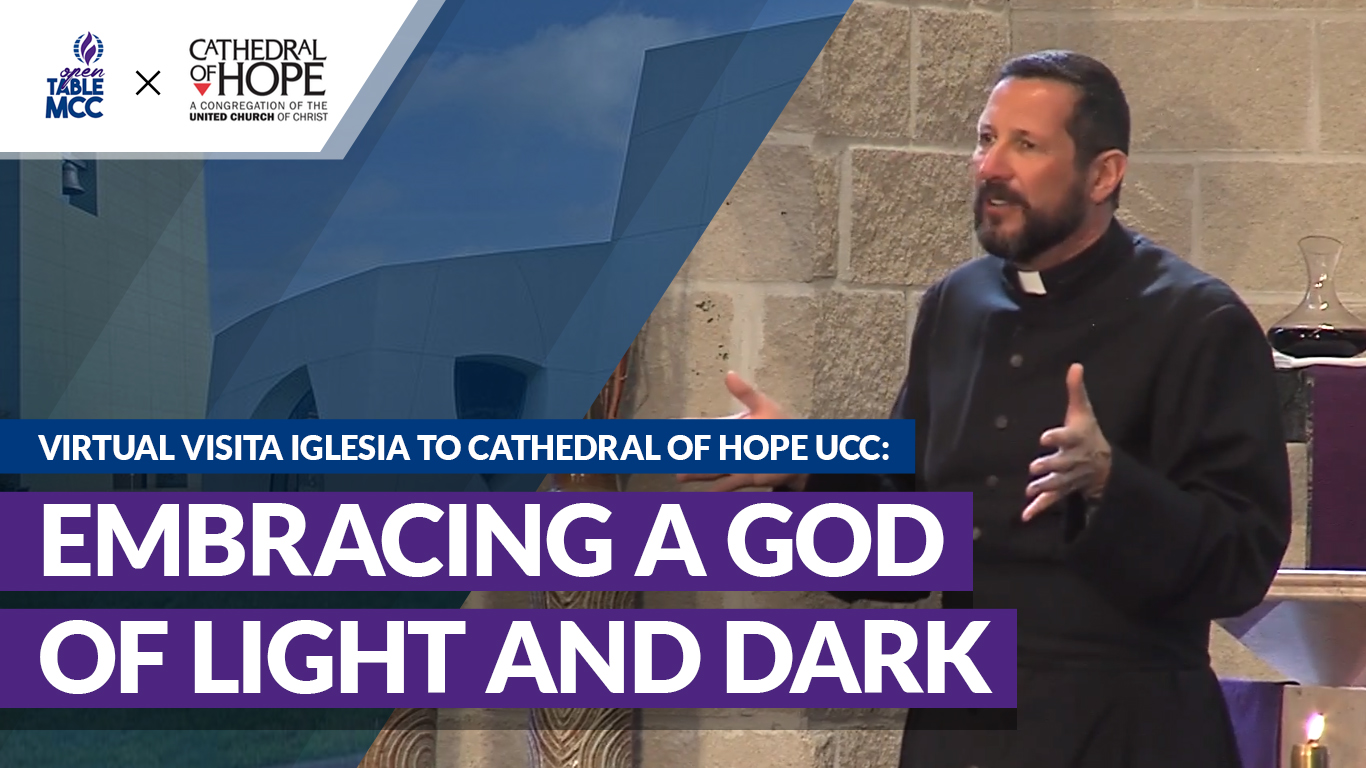Humble yourselves, therefore, under the mighty hand of God, so that he may exalt you in due time. Cast all your anxiety on him, because he cares for you. Discipline yourselves; keep alert. Like a roaring lion your adversary the devil prowls around, looking for someone to devour. Resist him, steadfast in your faith, for you know that your brothers and sisters in all the world are undergoing the same kinds of suffering. And after you have suffered for a little while, the God of all grace, who has called you to his eternal glory in Christ, will himself restore, support, strengthen, and establish you.
Scripture Reading
1 Peter 5:6-10 (NRSV)
How do we reconcile humility with pride?
As queer Christians, as members and fighters in this movement for LGBTQIA+ liberation, Pride has been the rallying cry of this movement. And, at the same time, we are a Church. And there are many places in the Bible which call for humility.
“God opposes the proud, but gives grace to the humble.”
So what do we do with that as queer Christians? What can we take from this letter written by Peter to churches in the provinces of Rome, and Asia Minor (which is modern-day Turkey and the surrounding area) who were being persecuted and suffering in exile, living as outsiders in that land? Is there something we can take from this passage?
Humility is necessary in all relationships, all forms of teamwork, and in a church.
First of all, let’s take a look at what Pride is.
Pride, in the general sense – covering both the most basic dignity for yourself, up to arrogance and egotism – is a way to protect how you see yourself. And to some degree this is necessary. It’s a necessary tool for its survival, especially when you are surrounded by people or a society that has a low regard for you. You don’t want to absorb that low regard and have a low view of yourself and have no self-esteem or self-respect.
I want to look at the history of why is it that Pride became the rallying cry of the LGBTQIA+ liberation movements. When I looked into it, it’s disputed and unclear where this term first became popularized, but one of the people credited with popularizing Pride is Craig Schoonmaker, who said, “We were going to create a number of events the same weekend as the march to bring in people out of town, and wanted to unite the events under a label. First thought was ‘Gay Power.’ I didn’t like that, so proposed ‘Gay Pride.’ There’s very little chance for people in the world to have power. People did not have power then. Even now, we only have some. But anyone can have pride in themselves, and that would make them happier as people, and produce the movement likely to produce change.”
This was in the time of Stonewall, the year after the first Pride, or as it was called then, the “Christopher Street Liberation Day.”
So for LGBT+ people to claim pride, it’s a reclamation of our dignity. To say our genders and sexualities are not something that society can make us feel small for. That we will not look down on ourselves.
As Tyrion Lannister, the dwarf from ‘Game of Thrones,’ said to John Snow, whose name “Snow” marks him as an illegitimate child… Tyrion said, “Let me give you some advice, bastard. Never forget what you are. The rest of the world will not. Wear it like armor, and it can never be used to hurt you.”
Pride is armor. That said, not every situation calls for us to don our armor in anticipation of being attacked. It can be harmful to ourselves and our relationships if we’re always on the defensive. If we so prioritize protecting our self-image, our ego, that we reflexively turn away from seeing any fault in ourselves. This can manifest as refusing to accept criticism, not being able to apologize, not being able to ask for help when you need it. Because you don’t want to be seen as weak.
Taking the instinct to protect how you see yourself to a destructive degree stems from insecurity. I’ve ruined a relationship because I couldn’t handle criticism. Probably harmed some more. An unhealthy, harmful degree of pride or ego can ruin relationships and bring down organizations.
Humility is a necessary skill. It’s the shadow work of facing aspects of yourself that you don’t want to see. And showing humility can be really hard. It’s scary because it’s risky. It’s an act of trust, of faith, to be vulnerable in humility, to take off your armor so you can tend your wounds. In this way, humility is an act of faith, in the people around you, and in yourself. And doing humility becomes easier when you have faith in God, and show humility before God.
“To humble yourself under the mighty hand of God.”
What do you think this means? It’s accepting that whatever problem you’re dealing with, whatever project you want to succeed, you can’t really control the outcome of. There’s a multitude of factors that can affect it, and you can never do things perfectly enough to have complete control.
We cast all our anxieties on God. Your worries, your concerns. We entrust them to God. And I think there’s a humility in believing you’re not an exception.
Affirm to yourself if you must, that whatever your shortcomings God can still use you for good. Whatever mistakes you’ve made you are not too far gone for God’s grace.
In psychology, this is akin to having what’s called a growth mindset as opposed to a fixed mindset. Believing in the potential that you can grow and change and learn. And if you believe in God, then you can believe and put your trust in something other than yourself. Something greater than yourself. Your own skills and your own potential.
Now, going to some more practical things, I’m going to address: “like a roaring lion your adversary the devil prowls around, looking for someone to devour.”
I’ll admit, I personally don’t factor the entity, “the devil,” into my own spirituality or worldview. That said, some of you may. So I want to clarify that what I’m talking about here is the devil as a useful metaphor – “diabolos” – the word that’s used in the Greek script. The Greek text, borrowed the word “diablos” from Latin, and when I looked up some of the meanings for it, what came up was “false accuser,” “slanderer.” So even if not the literal entity of the devil, there’s a lot in the world that can be slanderers, false accusers, or another one was “backbiters.”
Sometimes, there are, out there, roaring lions looking to devour us. There are people who seek to oppose us. Want there to be no queer liberation movement. There are bad people out there.
But also, sometimes, the false accuser is inside us. Which is not to say that we are “possessed by the devil;” it may mean that there’s an inner saboteur.
You gotta be vigilant about things that can cloud your judgement. It’s easy to be reactive in the moment. Which is why it helps to slow down and take a step back.
You can resist the false accuser when it comes to dealing with others. Resist the false accuser in your head making unproven accusations against people around you such as during times when we think, “oh, this person thinks you don’t know what you’re doing,” or “oh they think they know how to do your job better than you.”
Be humble. You don’t know what they’re thinking. Sometimes it helps to try taking a statement in good faith. Look for a charitable interpretation. Consider someone might want to help you, and have faith that others can see things that you don’t.
Also, resisting the false accuser means resisting to make false accusations against yourself. This goes back to having faith in yourself, which is easier through God. Know that your worth is not dependent on your work, your output. So, even if things didn’t go as you wanted, or even if you’ve embarrassed yourself or caused harm, knowing that you – unconditionally – have worth and are loved can make it easier to face that you’ve done harm, or did not do well. Doing that shadow work of incorporating negative aspects into your self image and seeing value in yourself.
“For you know that your brothers and sisters in all the world are undergoing the same kinds of suffering. And after you have suffered for a little while, the God of all grace who has called you to his eternal glory in Christ, will himself restore, support, strengthen and establish you.”
I think it helps to know that in whatever suffering we’re going through is not unique and others have experienced it, we can find support, advice in others, and knowing that, like God is always there, going through it with us in everything. And after you have suffered a little while. Because all suffering is temporary. Especially if you take an eternal view of things. And as a church, we have suffered through some dark times. As a community, we’ve suffered through some dark times. Persecution and living as outsiders, as the churches in Peter’s time that he was writing to did. And these things will pass. And like those churches, we can have faith in God to be the God of all grace, to cover for our shortcomings, because God is greater than all of our shortcomings. And we can have faith that God will call us to eternal glory in Christ, and restore, support, strengthen, and establish us.
True humility comes from a deep sense of self-awareness of who you are, what you can and cannot do, and when you can or cannot give yourself. True humility actually comes from self-trust and confidence. Arrogance and egotism come from insecurity. The armor of pride has served our community well. But to establish and maintain healthy relationships, and establish and maintain a healthy church, humility will be a necessary skill. And all this will, I pray, bring glory to God.
Amen.
Podcast: Play in new window | Download
Subscribe: Apple Podcasts | Spotify | RSS



